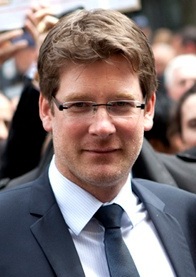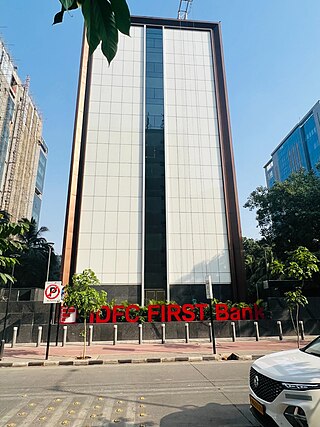
The Inter-American Development Bank is an international development finance institution headquartered in Washington, D.C., United States of America, and serving as the largest source of development financing for Latin America and the Caribbean. Established in 1959, the IDB supports Latin American and Caribbean economic development, social development and regional integration by lending to governments and government agencies, including State corporations.

The French Development Agency is a public financial institution that implements the policy defined by the French Government. It works to fight poverty and promote sustainable development. This public institution is active in Africa, Asia, the Middle East, Latin America, the Caribbean and the French overseas territories, where it finances and supports projects that improve living conditions for populations, promote economic growth and protect the planet.

An export credit agency or investment insurance agency is a private or quasi-governmental institution that acts as an intermediary between national governments and exporters to issue export insurance solutions and guarantees for financing. The financing can take the form of credits or credit insurance and guarantees or both, depending on the mandate the ECA has been given by its government. ECAs can also offer credit or cover on their own account. This does not differ from normal banking activities. Some agencies are government-sponsored, others private, and others a combination of the two.

The National Bank for Economic and Social Development is a development bank structured as a federal public company associated with the Ministry of the Economy of Brazil. The stated goal is to provide long-term financing for endeavors that contribute to the country's development. BNDES is one of the largest development banks in the world. Its non-performing loan ratio is also less favorable (2.2%) compared to the CDB's that stands below 1%.
An international financial institution (IFI) is a financial institution that has been established by more than one country, and hence is subject to international law. Its owners or shareholders are generally national governments, although other international institutions and other organizations occasionally figure as shareholders. The most prominent IFIs are creations of multiple nations, although some bilateral financial institutions exist and are technically IFIs. The best known IFIs were established after World War II to assist in the reconstruction of Europe and provide mechanisms for international cooperation in managing the global financial system.

Nicaragua is a country in Central America with constitutional democracy with executive, legislative, judicial, and electoral branches of government. The President of Nicaragua is both head of state and head of government. Executive power is exercised by the government.

The Development Bank of Southern Africa (DBSA) is a development finance institution wholly owned by the Government of South Africa. The bank intends to "accelerate sustainable socio-economic development in the Southern African Development Community (SADC) by driving financial and non-financial investments in the social and economic infrastructure sectors".
This article discusses banking in Cuba and gives an overview of the recent past. For details on the Cuban economy in general, see economy of Cuba.
Banking in Nicaragua, prior to 1978, consisted of the Central Bank of Nicaragua and several domestic- and foreign-owned commercial banks. One of the first acts of the Sandinista government in 1979 was to nationalize the country's banking system, in an "attempt to promote community banking and support the rural poor".
Alonso García-Tamés is a former CEO of the National Bank of Public Works and Services (Banobras) and General Director of Operations of the Bank of Mexico.

The Central Bank of São Tomé and Príncipe is the central bank of São Tomé and Príncipe, a Portuguese-speaking island nation off the western equatorial coast of Central Africa.

Pascal Canfin is a French politician of La République en marche (LREM) who has been serving as a Member of the European Parliament (MEP) since 2019. In the 2019 elections for the European Parliament, he was elected in the list of Renew Europe group and serves as chair of the Environment, Public Health and Food Safety Committee; following his initiative, the European Parliament declared in December 2019 a "climate state of emergency". He was re-elected in 2024.
Proparco is a development finance institution partly owned by the French Development Agency (AFD) and private shareholders from the developed countries.

Banco del Estado de Chile, commercially operating under the brand BancoEstado, is the only Public Bank in Chile and was created by government decree in 1953. It provides financial services to consumers and companies, with a focus on national coverage in terms of geography and social sectors and a particular emphasis on the unbanked and small and medium enterprises, although it serves all types of businesses. It is the country's largest mortgage lender and largest issuer of debit cards. In addition, BancoEstado performs part of the Chilean government's financial activities through the accounts managed by the General Treasury of the Republic of Chile.

The National Investment Bank is a Mozambican state owned development bank in association with the Mozambican Ministry of Finance. Its goal is to provide long-term financing for sustainable endeavours that contribute to the country's social and economic development. The bank's main areas of activities are Infrastructure, Natural Resources, Energy, Agriculture, Industry & Commerce and Transportation. BNI also seeks to strengthen the capital structure of private companies and the development of capital markets.

Banco Bilbao Vizcaya Argentaria, S.A., better known by its initialism BBVA, is a Spanish multinational financial services company based in Madrid and Bilbao, Spain. It is one of the largest financial institutions in the world, and is present mainly in Spain, Portugal, Mexico, South America, Turkey, Italy and Romania.

The Sustainable Development Investment Partnership (SDIP) is an international public-private partnership which aims to use blended finance to support sustainable infrastructure investments in developing countries. The SDIP thus brings together public, private and philanthropic entities to work towards the Sustainable Development Goals (SDGs) set out by the United Nations. The SDIP was launched at the United Nations Conference on Financing for Development in Addis Ababa in July 2015 with 20 founding members, which has since risen to 42. The World Economic Forum and OECD were founding partners and provide institutional support. SDIP's inaugural meeting took place in Geneva, Switzerland on 15 September 2015.
Rémy Rioux is a French high-ranking civil servant. He serves as the chief executive of the French Development Agency.

IDFC FIRST Bank is an Indian private sector bank formed by the merger of the banking arm of Infrastructure Development Finance Company and Capital First, an Indian non-bank financial institution.













